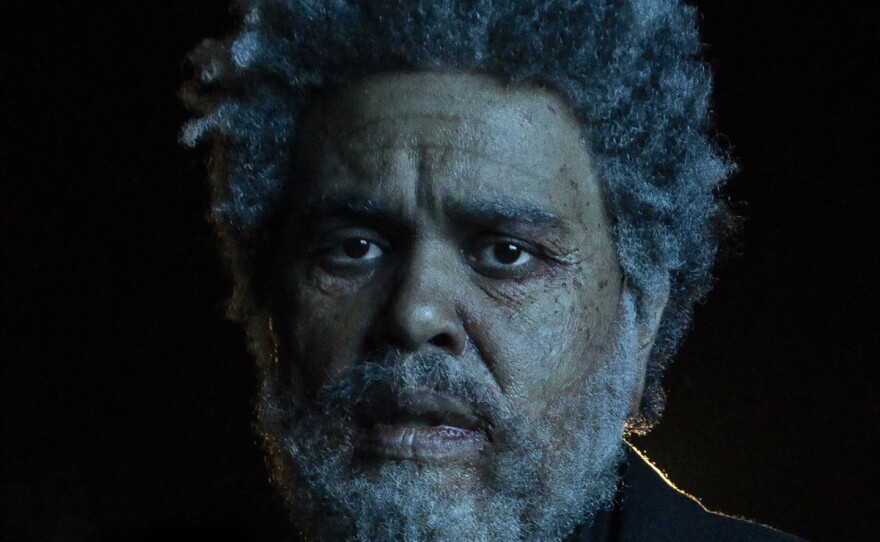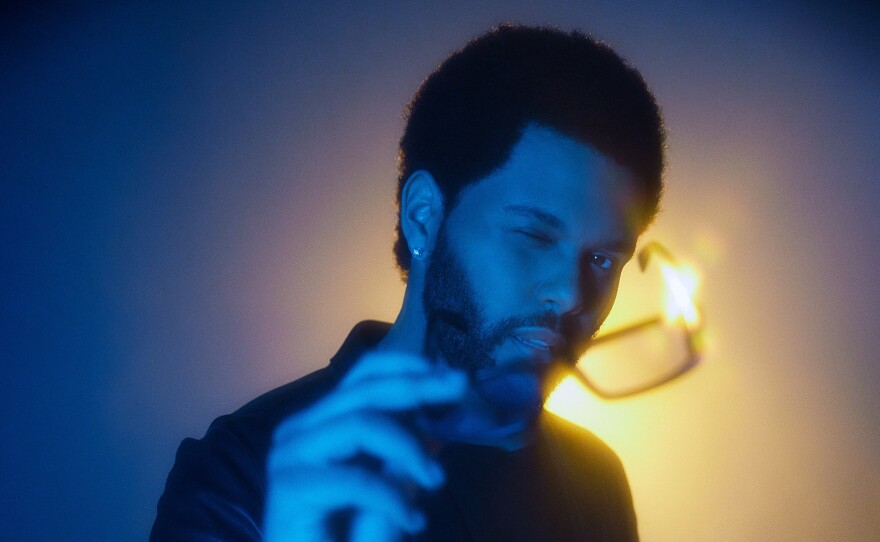"Now that all future plans have been postponed, and it's time to look back on the things you thought you owned, do you remember them well?" actor Jim Carrey, serving as narrator, asks listeners on the final track of The Weeknd's new album. The dawn climbs out of the darkness where we've roamed for the erratic past two years to give its clearest radio signal — Dawn FM. The album's cover objectifies the future by way of a depiction of an elderly version of singer Abel Tesfaye, the version who escapes Cain and the legacy of his name, and remains a good shepherd like we're told in the Bible. It's an image that suggests we enter eternity by enduring the bleakness of now. The cover functions the same way images of Daniel Dumile as MF DOOM in his signature metal mask function — to distort our perception of a familiar messenger so that we can hear new territories in the sounds they're about to deliver.
The Weeknd relishes his new territory, moving from brooding the horrific to a lighthearted and at times epiphanic acceptance of it that allows a more upbeat narration. The album's synths hit like hunting daggers instead of misplaced cupid's arrows, which allow for the romance of self-aware introspection instead of the distraction of star-crossed lovers. From the meditative prayer that is the opening and title track of Dawn FM, which pleads for faith and sets up the album's combined world of a radio show and an afterlife, we move into "Gasoline," a cheerful track about disaster. The song confesses restlessness, nihilism and detachment from the body — "It don't mean much to me," he sings.

A dance track that flirts with sabotage is exactly what this era calls for. Where we might have expected The Weeknd's signature indulgent love songswith their wisp of divine afropessimism, Dawn FM advances the persona of his work from an "us against the world" pantheon to a post-apocalyptic register where love accents despair and chaos, and a blissful inner decadence drives survival. The song is reeling but also entirely composed, a consummate balancing act, and it's a philosopher's song in that it explores the concept of dying and being reborn into your own life. Even the title "Gasoline" combines the utilitarian and the destructive by purposing what is used for fuel toward getting rid of the singer's body in the event that his soul leaves it in the middle of the night, high on drugs and the erotic.
The common image or myth of walking into the light of eternal life along with the concept that the darkest hour is before the dawn propels the music. Across the album, depictions of the end of the world merge with the feeling of being at a party where some grand renewal will be unveiled. The lyrics brood and lament, but paradoxically cheerful beats and chipper synth play evocative of the boldness and resilience of '80s music from New Order to Thriller override any tendency to wallow, proving two realities are possible simultaneously and can even co-exist oblivious to one another. One can be both suffering and saved, in love and indifferent, in the afterlife and being reborn. The mask and the agony in Abel's eyes as they peek through it becomes cautionary and lets us consider whether we would like to age into the shape of our fears or the shape of our most heroic dreams.
All of this depth from a "pop" album.Where the genre is often accused of being deceptively or deliberately naïve about the troubles of the world, The Weeknd's new work is anything but as it confronts and serenades the constant threat of abrupt endings that marks this era, and refuses to oversimplify that menace with pure dejection or pure ecstatic. It's terrible and alarming and exhilarating and lucky to be alive now, even amidst the thrills. He fittingly calls one track "Every Angel is Terrifying." Just when it feels like nothing is coming to rescue us, honest music does. The track features a poetic musing about rescue: "Who, if I cried out, would hear me among the angel's order?" The layering of soothing beats and tones suggestive of the illusion that life is a party, with doomsaying lyrics that expose the harsh truth that everyone at that party is suffering the effects of its overstimulation, gives listeners the unexpected jolt needed to face that shape-shifting messenger on the cover without recoil — candor is energizing here.
Screaming into the abyss is replaced by skipping, trotting, and dancing into it on Dawn FM, and coupled with its haunting cover, an accusatory is formed. Are we too shallow to endure the now? What happens when glamour recedes but its ghost remains? Why is the sound so retro it floats, while the lyrics describe someone inconsolable, even suicidal? Do we have collective fantasies about ruining ourselves before the world tries to ruin us? "You'd rather leave than to watch me die," the song "Less Than Zero" assumes like an inverse of Prince's "7," blaming the self: "I'll always be less than zero." He situates the self and the light in the underworld as entities we must be brave enough to call forth and bring with us above ground, redemptive possibilities that mumble beneath our habits of consumption and play.
It's a brave way to construct the universe of an album, during a time when almost everyone is searching for dawn on the dial, within the brutal frequency war between upheaval and peace we find ourselves navigating. It's impressive without being desperate — this is the work of someone who possesses equal parts ennui and enthusiasm for life, who wants to see into the future of his hero's journey but has the humility to cast himself as mortal rather than the hero of that uncertain future. Everything we long to transcend is here to be danced off the stage of our consciousness the way the sun goes dark for hours so the subconscious of the planet can breathe and reset, make impossibly frightening demands, and then wake up to those demands grinning and thinking: maybe I can accomplish that in a song, if not in the flesh.
Tesfaye's Ethiopian roots feel present throughout the album, as both a source of faith and the keen ability to layer lament and praise, hope and turmoil, death and eternity, as if they share one skin. Some of the beauty and complexity of Ethiopian jazz is transferred to Western popular music by way of this work, an unlikely achievement that proves music is where the impossible happens. When you surrender to Dawn FM, one of the album's central confessions — "back then I was starry eyed, and now I'm so cynical" — seems to recede or move in the opposite direction. You feel how exploration of the darkest hours compels us to transmute them, while pretending we're in an easygoing world and ignoring the rest would leave us forever jaded.
Fantasy, finally, is the work of Dawn FM. Not all fantasies are about ideal realities, some contain a mixture of the what-if of dread and the what-if of perfection, and turn that into the yes of desire. The music here traces Abel Tesfaye's own path from risk to reward. He pursued his dreams in a pattern that many would find frightening, and reached them at a level that many wouldn't be able to sustain. To hold onto his authentic self requires this looking in every direction at once, a willingness to grapple with demons and ability to face the fact that today's world is confounding and many want to disassociate and project to cope with it. Rather than reaching for salvation, Dawn FM descends into heaven, assuring on the album's outro: "Heaven is closer than those tears on your face."
Copyright 2022 NPR. To see more, visit https://www.npr.org. 9(MDAzMjM2NDYzMDEyMzc1Njk5NjAxNzY3OQ001))






